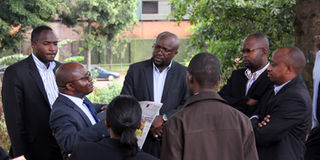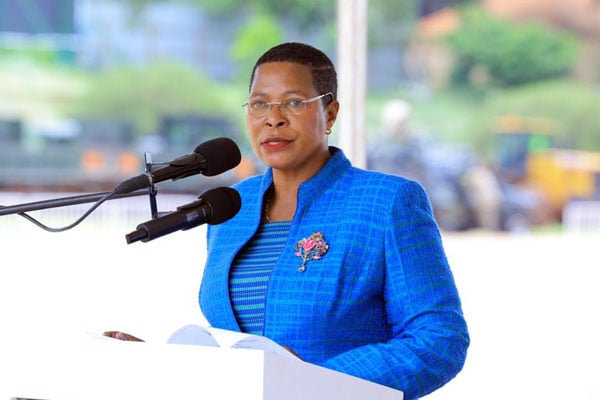Police interrogate Monitor journalists

L-R: Monitor Publications Ltd lawyer James Nangwala speaks to the Daily Monitor Managing Editor Don Wanyama and reporters Richard Wanambwa and Risdel Kasasira at the CIID headquarters in Kibuli yesterday. PHOTO BY Abubaker Lubowa.
What you need to know:
Police say Don Wanyama, Risdel Kasasira and Richard Wanambwa refused to cooperate and divulge information.
Kampala
Police yesterday charged three Monitor journalists with refusal to cooperate and divulge information in relation to the Gen. David Sejusa affair.
Managing Editor Don Wanyama and reporters Risdel Kasasira and Richard Wanambwa endured a full day’s interrogation. At one point, the police suddenly changed their status from potential witnesses to potential suspects when it asked them late in the afternoon to sign charge-and-caution statements.
Mr James Nangwala, the Daily Monitor lawyer, said his clients were also charged with refusal to avail a document contrary to the Police Act. “My clients gave them all possible information and explained why they could not name their source. We were, however, surprised that they were later charged contrary to the summon which called them to give light and help in investigations,” Mr Nangwala said.
The journalists were questioned by a group of 10 detectives led by Mr Fred Mulondo of the Media and Political Crimes unit. Police wanted to establish the source of Gen. Sejusa’s letter to the Director General of ISO.
Mr Wanyama later said naming sources of information contravenes journalists’ ethical obligations. “The police largely wanted to know the source of the letter. We politely told them we could not divulge such information since it would be a breach of our trust with the public and our sources. We also made it clear that the law protects us,” he said.
Police ordered the trio to re-appear today (Wednesday) at 11am. The letter was instructing the Internal Security Organisation boss to investigate claims of an alleged plot to assassinate top government officials who are perceived to be opposed to the so-called ‘Muhoozi project.’



